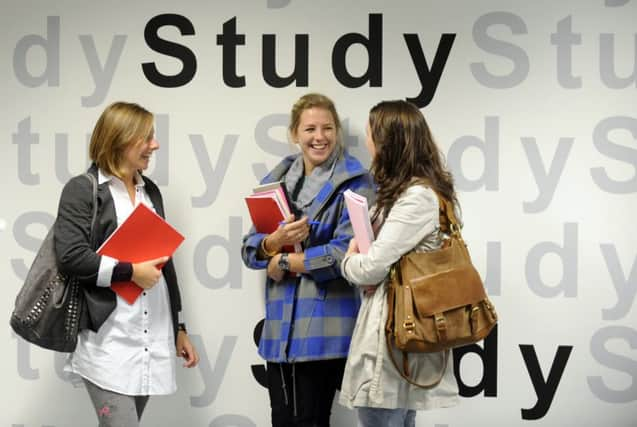Kirsty Gunn: University open season such an exciting time for teens'¦ and their parents


Or whether it’s just the overall feeling of camaraderie as rafts of inquisitive teenagers and their strings of mums and dads give each other looks and smiles, and trade tips and strategies about how this open day compares with another… I don’t know, but the whole thing just gets me fired up.
We’ve been going around Edinburgh this week, my elder daughter and I, as she is keen to read History there and has heard nothing but how “completely fabulous” it is from various friends who have brothers or sisters or other friends who are there.
Advertisement
Hide AdAdvertisement
Hide Ad“For goodness’ sake calm down” she whispered to me as we were standing on line outside the entrance to the Assembly Hall, and I was holding forth to her and her friend about how wonderful university education is and how I wished I was setting off to do some course or other and breaking open the limitations of my thought.
“You’re at the beginning of one of the most interesting phases of your life!” I’d been telling her and her friend Maia who wants to study Chemistry and French. “You’re going to have a time full of adventures and intellectual enquiry and – “Oh STOP it, Mum!” Millie elbowed me. “Everyone can hear…”
We went inside, everyone clutching paper coffee cups and information sheets, to hear Dr Jeremy Cramer from the History Department talk about why Edinburgh is a good place to choose, and then three of his students stood up to describe their own experience. All tip top PR, of course, this business of having your institution’s lovely young people describe it to prospective “clients” – as a lot of universities now, rather frighteningly, are calling the students who come through their doors. And a sensible way, too, perhaps, to encourage the parents, the ones who’ll be hit up for hard cash as their chicks fly the coop, after all, that their fledglings may turn into such swans.
But it’s also lovely to hear confident and well-educated young adults talk articulately and clearly about what it was about their course of study they so appreciated. How could I not be excited?
After the presentation Millie wanted to go up and ask Dr Cramer something about how many times she might expect to meet with her “Personal Tutor”, as they call them there, as she’d heard that access to senior members of staff can be tricky at Edinburgh. When he asked what she was wanting to study and she answered, he beamed at her, “Ah, so you’re one of us!” And Millie beamed back.
The whole thing couldn’t be nicer for a parent to witness. Even if the process of moving her on to the net stage of her education is going to cost us an arm and a leg, and even if there’s no doubt the numbers of students enrolling on courses now are up and up, as institutions want to get in as many fee-paying “customers” we might as well call them, as they can, and students and staff, both, are under pressure as a result…
Still, universities are universities. Despite the brutal economic agenda that requires that everything, even education, be matched to an outcome that can be tested and paid back – which is why all the universities talk about employability at all these open days you go to, so as not to seem they would have you spend four years on just getting educated. Despite the fact that capitalism has so had its way that I could have written that sentence – when “just getting educated” is the most important thing we can do, for ourselves, and our children. Still, we prize the idea of them, don’t we?
At my own university we talk the employable/vocational talk too. And the other buzzword at Dundee is “transformation” – a word that might be seen as aligning itself to the education agenda emanating from Holyrood. But we are clear at Dundee, too, that education, though it should be available for all, must begin at primary level, pre-primary level, in fact, for that to be the case. It’s not enough to expect that our universities be made a kind of clearing house for children who have not had government resources afforded to them earlier in their education. How to expect tertiary education to be for available for all, as the rhetoric goes, when primary and secondary classes are overcrowded and there is no money for books and computers? Educate everybody, always, from the ground up. That’s the way forward. Not turn our universities, with their impeccable credentials, historical gravitas and enlightened and intellectually adventurous programmes of study into degree factories so that we can be said to be educating the nation.
Advertisement
Hide AdAdvertisement
Hide Ad“By creating we think, by living we learn,” were the words of Patrick Geddes, the great scientist, philosopher, philanthropist and one of the University of Dundee’s founding fathers. Now that’s more like it.
Over at the University of Glasgow, where the Poetry and Poetics course opens up to some 400 students at year one, the groovy modernist and poet Dr Jane Goldman was telling me about C A Conrad who’s just finished a reading tour of Scotland. His poem “Oblivious Imperialism Is The Worst Kind” has been in my mind this week after Trump’s intervention in Syria and his use of it as political opportunity. Would that the blow-dried blond’s huffing and puffing and fake sentimentality about the death of children be exchanged for the poet’s words.
Would that the act of poetry, and the universities that have always honoured its place in our intellectual development, be something we might practise more in our volatile, shape-shifting world where sometimes, as in the case with America’s retaliation now for the murder of civilians, even the bad guys can look as if they might be doing good.